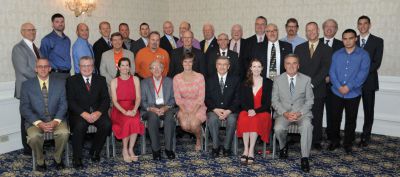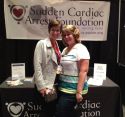
 LAS VEGAS, NV--The 2014 Emergency Cardiovascular Care Update (ECCU), a biennial conference of the Citizen CPR Foundation held earlier this month in Las Vegas, celebrated survival from sudden cardiac arrest. Each plenary session was introduced by a survivor, and the conference featured an educational track targeted to survivors and rescuers, including a session, “Addressing the Needs of Survivors and Loved Ones,” presented by the Sudden Cardiac Arrest Foundation.
LAS VEGAS, NV--The 2014 Emergency Cardiovascular Care Update (ECCU), a biennial conference of the Citizen CPR Foundation held earlier this month in Las Vegas, celebrated survival from sudden cardiac arrest. Each plenary session was introduced by a survivor, and the conference featured an educational track targeted to survivors and rescuers, including a session, “Addressing the Needs of Survivors and Loved Ones,” presented by the Sudden Cardiac Arrest Foundation.
One of the highlights of the conference was a reception and dinner for survivors and rescuers. Opening remarks were made by Tom Aufderheide, MD, President of the Citizen CPR Foundation, and James Niskanen, a survivor and member of the CCPRF Board of Directors. Niskanen skillfully worked the crowd, inviting testimonials from several survivors, including Scott Nevers, Matt Krueger, Kathie Reilly, and Michael Snyder, Jr. Here are their stories.
Scott Nevers, 27, Biddeford, Maine
 After running the bases in his softball league last summer, 27-year-old Scott Nevers collapsed. His teammates called 911 and first responders arrived 5-10 minutes later. EMTs and firefighters worked on Scott for 45 minutes in the ambulance, administering CPR and 18 AED shocks. Arriving at Maine Medical Center, Scott was shocked three more times. He was clinically dead for more than 25 minutes. Once stabilized, he was placed in a medically induced coma for four days. Doctors then inserted an implantable cardioverter defibrillator and he was released from the hospital the next day.
After running the bases in his softball league last summer, 27-year-old Scott Nevers collapsed. His teammates called 911 and first responders arrived 5-10 minutes later. EMTs and firefighters worked on Scott for 45 minutes in the ambulance, administering CPR and 18 AED shocks. Arriving at Maine Medical Center, Scott was shocked three more times. He was clinically dead for more than 25 minutes. Once stabilized, he was placed in a medically induced coma for four days. Doctors then inserted an implantable cardioverter defibrillator and he was released from the hospital the next day.
Matt Krueger, 36, St. Charles, Illinois
 Matt Krueger, a husband and father of four young children, was only 36-years-old when he suffered SCA while playing basketball on March 2, 2013. Matt’s friend, Tim Sjostrom, reacted quickly when Matt went down. As a financial advisor, Tim admits he was the last person who would “rip an AED out without knowing how to use it.” Thankfully, he had watched a video about using an AED. Tim grabbed the gym’s AED and with the help of friend Ron Newman, used it to save Matt’s life. Reports from the AED and the doctor were conclusive—Matt had died from SCA and was subsequently revived by a single shock.
Matt Krueger, a husband and father of four young children, was only 36-years-old when he suffered SCA while playing basketball on March 2, 2013. Matt’s friend, Tim Sjostrom, reacted quickly when Matt went down. As a financial advisor, Tim admits he was the last person who would “rip an AED out without knowing how to use it.” Thankfully, he had watched a video about using an AED. Tim grabbed the gym’s AED and with the help of friend Ron Newman, used it to save Matt’s life. Reports from the AED and the doctor were conclusive—Matt had died from SCA and was subsequently revived by a single shock.
Kathie Reilly, 33, Phoenix, Arizona
 What started as a normal Tuesday evening became a nightmare before the night was out. Kathie and her husband went to bed, watched a bit of FoodNetwork TV and chatted about the day. Around 10:30 pm Scott woke to an odd sound. Kathie doesn’t snore, but she was making strange noises, and yet she appeared asleep. She did not seem conscious at all, and wasn't breathing. As a Flagstaff Sheriff’s deputy he was trained as a first-responder, so he tried a sternum rub to wake Kathie up—to no effect. Suddenly very worried, he turned on the lights, moved Kathie to the floor and started CPR. More...
What started as a normal Tuesday evening became a nightmare before the night was out. Kathie and her husband went to bed, watched a bit of FoodNetwork TV and chatted about the day. Around 10:30 pm Scott woke to an odd sound. Kathie doesn’t snore, but she was making strange noises, and yet she appeared asleep. She did not seem conscious at all, and wasn't breathing. As a Flagstaff Sheriff’s deputy he was trained as a first-responder, so he tried a sternum rub to wake Kathie up—to no effect. Suddenly very worried, he turned on the lights, moved Kathie to the floor and started CPR. More...
Michael Snyder, Jr., 27, Richmond, VA
 Michael Snyder, Jr., was 27 when he suffered sudden cardiac arrest in late 2013. When he became unconscious, his family rushed into action, calling 911. Richmond Virginia Ambulance Authority dispatchers talked them through CPR. The coaching kept Michael alive long enough for EMS to rush him to the hospital. “It’s amazing to see how many people it took to make this go right and without any one of them, it would never have worked,” he said. “I look at life totally differently now. I’m just so thankful for getting a second chance at life.”
Michael Snyder, Jr., was 27 when he suffered sudden cardiac arrest in late 2013. When he became unconscious, his family rushed into action, calling 911. Richmond Virginia Ambulance Authority dispatchers talked them through CPR. The coaching kept Michael alive long enough for EMS to rush him to the hospital. “It’s amazing to see how many people it took to make this go right and without any one of them, it would never have worked,” he said. “I look at life totally differently now. I’m just so thankful for getting a second chance at life.”
Creating Community to Save Lives
The event wrapped up with an inspirational speech, "Creating Community to Save Lives," by Joseph P. Ornato, MD, Professor and Chairman, Emergency Medicine, Virginia Commonwealth University, an internationally recognized leader in the field. "It takes a regionalized effort to create a community that is optimally configured to save lives from out-of-hospital cardiac arrest," he said. "All hospitals should be capable of initiating (inducing) therapeutic hypothermia, but there should be a limited number of hospitals to which these patients are then transferred for continued advanced post-resuscitation care. This care should include continuous EEGs, a limited number of physicians and nurses who are specially trained to provide their care and decision-making, detailed neurocognitive testing at hospital discharge and at 3-6 months, as well as brain injury rehabilitation for those who need it."
